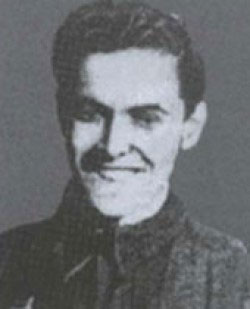Juris Vater was born in 1917 in Riga, Latvia. In his youth he belonged to an underground Communist youth movement. After the annexation of Latvia to the USSR in 1940, Vater was drafted into the Red Army. He began serving as a medical orderly with the 201st Latvian Infantry Division of the Red Army, but after being wounded, in 1942, as a convinced Communist and also a speaker of German, he was assigned to political work. By 1944 Vater had risen to the rank of captain and the position of senior instructor of the political department of the 1st Ukrainian Front.
In February 1944, Vater was assigned to the political department of the 27th Army to expedite the surrender of a surrounded group of enemy forces in the southern Ukraine. He broadcast messages intended for the German soldiers. Meanwhile in an attempt to break through the Soviet lines, the surrounded enemy group (that included Waffen-SS units) captured the village Shenderovka, where Vater's broadcasting station was located. Vater sent his assistants to the Soviet lines, but he himself stayed in the village. He said to the commander of the battalion that defended Shenderovka: "I am not leaving the battle field, I am staying with your battalion and will fight together with you against the Germans .".He was lightly wounded, but continued fighting. As an officer, Vater took over the command of a unit of soldiers to his command. While his unit was repelling German attacks, he personally killed about twenty enemy soldiers.
During his third counter-attack, Vater was seriously wounded in the abdomen. His platoon decided to retreat from Shenderovka and left Vater in a peasant's hut. From there the seriously wounded captain continued to shoot at the SS troops. When the latter forced their way into the hut, he cursed them roundly. The enraged SS-men first beat him and then hanged him, and finally burned down the hut.
The political department of the 1st Ukrainian Front recommend that Vater be posthumously awarded the title of Hero of the Soviet Union, but the recommendation was rejected and Vater was awarded only the Order of Lenin. After the war a monument was erected to him in Shenderovka. The inscription identified Vater as a Latvian Communist, not as a Jew. In the Soviet postwar propaganda literature, Vater is also referred to as being Latvian.







